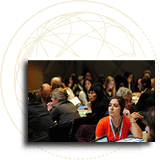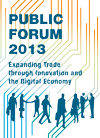Summary of 2013 forum
The WTO Public Forum 2013 on ’Expanding Trade through Innovation and the Digital Economy’ drew a wide and varied participation from various stakeholders — NGOs, Businesses, Governments and the academia alike. The Public Forum is unique in the sense that it not only allows for the stakeholders to participate in the ongoing discussions, but also allows them to organize sessions of their own to draw attention to specific subjects under the broader theme. True to this approach, for the first three days of October, 2013, the WTO was the centre of various plenaries, working sessions, workshops and activities which brought to front some vibrant discussions that truly captured the effects the organization had on the public sphere.
Day One began with a keynote address from Michael Froman, the United States Trade Representative, who put into perspective the challenges that lay ahead of the multilateral trading system in the following few months and the importance of striking a deal on Trade Facilitation in Bali in order to secure further development for small and poor countries. The opening plenary saw participation from WTO Director-General Roberto Azêvedo, Alexander Stubb, Minister for European Affairs and Foreign Trade of Finland, Talal Abu-Ghazaleh, Chairman of Talal Abu‑Ghazaleh Organization, Luo Feng, CEO of IZP technologies and Francis Gurry, Director General of the World Intellectual Property Organization (WIPO) who were in agreement about the changing rules of trade that innovation has brought about and the need for businesses and governments to respond to these changes such that the borderless world of innovation would not undermine the system of rights and obligations of the participants of the knowledge era.
The rest of the day saw numerous discussions on various sub-topics: the businesses gave their perspectives on factors that affected innovation and technological diffusion in the Working session co-organized by the IFPMA, CropLife International and Innovation Insights; Developing countries highlighted the importance of innovation as a growth strategy for the Global South and the impact of TRIPS on the same in the session by OIF and CUTS International; the World Trade Institute’s session dealt with the internet economy and the future of international trade law. Global Value chains made a recurrent appearance in various sessions: whether it was BUSINESSEUROPE that was re-thinking the trade policy regime, or the Intellectual Property Division of the WTO Secretariat that conducted a workshop on managing knowhow and trade secrets; the discussion threw light on the inconsistency of a legal regime to manage trade secrets given its complex and diverse nature across sectors, industries and countries; it however did make a distinction between procedural and declarative knowledge and how the former is important for technology transfer. Grameen Foundation focused on the impact that innovation has on the rural poor while the Sesame Workshop showcased how mobile technology was innovating education around the world. The Federation of Industries of the State of São Paulo (FIESP) organized a session on energy trade that recognized the gaps in the existing rules with respect to its regulation in an increasingly globalized world; panellist Vera Throstensen called for the creation of a Working Group to discuss energy issues at the WTO that would incorporate the conversation on green subsidies and the interaction between multilateral and plurilateral issues. The ACP countries together with FES and ITC pointed out the significance of e-commerce that was enabling Small and Medium Enterprises to become Micro- multi nationals by opening up a global market for them but at the same time lack of financial infrastructure, ICT infrastructure, skills and trade facilitation were posing challenges for them.
The momentum of Day one continued well into the second day of the Public Forum. The keynote address by the CERN DG, Dr. Rolf-Dieter Heuer gave a whole other insight into the importance of fundamental scientific research and the long term benefits to the global society. The Plenary session saw a continuation of the same subject where scientific innovation was put into perspective as the main driver of competitiveness and an engine for consumer welfare. The panellists were Dr. Heuer, Rupert Keeley, Chief Executive Officer of PayPal EMEA, Mauricio Antonio Lopes, President of Embrapa and Helen McCallum, Director-General of Consumers International (CI). Some critical messages from the discussions were the interventions by Mr. Lopes in explaining how Brazil’s reliance on scientific agriculture and an enabling policy environment was critical in transforming the nation from a food insecure country to a net exporter of food crops, as well as Helen McCallum’s thrust on the issue of striking a balance between consumer welfare and protection that arises out of a digital economy where trade has crossed borders and is governed by differential legal regimes .
The various sessions by the Forum participants focused on innovation and the needs of consumers and small businesses: the Commonwealth Secretariat organized a session on the issues of LDCs, small and vulnerable economies and the Sub-Saharan Africa when it came to trade and technology; IDEAS Centre shared its learnings on promoting innovation and investments in LDCs; eBay and Consumers International shared how technology enabled trade was empowering consumers worldwide. In addition, there were also session that focused on the social aspects of innovation: IFPRI looked at the possibility of leveraging ICT advancement to drive inclusive growth; Nexus Foundation brainstormed on the ways the digital economy could contribute to the vibrant rural economies; and Wireless Access for Health expressed views on how PPPs could re-invent innovation itself.
The third and Final Day of the Public Forum saw continuation of various sessions on trade and innovation organised by UNCTAD, CSI, ICANN, etc., but another important element were the discussion on the Bali ministerial. The OECD and the Global Express Association highlighted the importance of Trade Facilitation Agreement while the Commonwealth Secretariat put the development perspective as the primary agenda. The Quaker United Nations Office; Third World Networks and OWINFS; World Farmer’s Organization; AmCham EU, etc. were other entities that shared their perspectives on what should form the thrust of Bali negotiations. The discussions ranged from the importance of achieving a decision on the public stockholding for food security and right to food purposes, to the issue of ensuring a functional and commercially meaningful special and differential treatment for the LDCs. The significance of the trade facilitation agreement with respect to greater jobs and welfare gains were brought to light as was the importance of a dynamic post-Bali and post-2015 agenda for continuing the growth and development momentum.
The daily sessions were interspersed with Mid-Day Spotlights that featured the release of the latest reports from Inter-Governmental Organisations. The Global Innovation Index 2013 by WIPO; The Global Information Technology Report 2013 - Growth and Jobs in a Hyper connected World by the World Economic Forum; as well as the World Trade Report — Factors Shaping the Future of World Trade by the WTO were launched over the three days.
And finally, exhibiting the most interesting installations, the WTO had been converted into an Innovation Corner showcasing how innovation can enhance countries’ trading capacities and create trade opportunities. It highlighted in particular how the private sector and others have utilised innovation and technology to boost international trade. Whether it was Masset SA setting up a working 3D printer, or the ITC showcasing its Kenya based ICT intervention that is helping small farmers integrate into export driven supply chains, or TradeLab setting up a community of legal experts offering legal services for free to small businesses and poor countries, there were practical examples aplenty on how innovation was facilitating and expanding the boundaries of international trade.
All the sessions including the two plenary debates have been recorded and filmed. They can be viewed on the WTO website.
NGO contact point
Anoush der Boghossian
NGO Liaison Officer
0041 22 739 50 75
[email protected]

